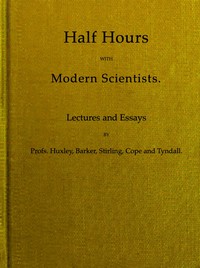Half Hours With Modern Scientists: Lectures and Essays by Thomas Henry Huxley et al.
"Half Hours With Modern Scientists: Lectures and Essays" by Thomas Henry Huxley et al. is a collection of scientific essays and lectures published in the late 19th century. The work compiles insights from multiple authors, primarily focusing on various aspects of physical and vital forces, and their interrelationship, along with discussions on the methodologies underpinning scientific inquiry. It targets readers interested in understanding modern scientific thought and its implications for both philosophy
and religion. At the start of this collection, the general introduction outlines the purpose and significance of the essays that follow, explaining that "scientist" as a term refers to those devoted to physical sciences and posits a need for concise communication of scientific principles to a lay audience. The introduction presents Huxley’s essay on "The Physical Basis of Life," highlighting the importance of protoplasm as a matter common to all living beings, establishing a threefold unity across life forms. Through engaging language, it emphasizes the interconnectedness of life and matter while introducing the complexities and nuances inherent in scientific examination, paving the way for deeper explorations into the nature of existence and our scientific understanding. (This is an automatically generated summary.)
Read or download for free
| How to read | Url | Size | |||
|---|---|---|---|---|---|
| Read now! | https://www.gutenberg.org/ebooks/66177.html.images | 550 kB | |||
| EPUB3 (E-readers incl. Send-to-Kindle) | https://www.gutenberg.org/ebooks/66177.epub3.images | 456 kB | |||
| EPUB (older E-readers) | https://www.gutenberg.org/ebooks/66177.epub.images | 462 kB | |||
| EPUB (no images, older E-readers) | https://www.gutenberg.org/ebooks/66177.epub.noimages | 269 kB | |||
| Kindle | https://www.gutenberg.org/ebooks/66177.kf8.images | 598 kB | |||
| older Kindles | https://www.gutenberg.org/ebooks/66177.kindle.images | 572 kB | |||
| Plain Text UTF-8 | https://www.gutenberg.org/ebooks/66177.txt.utf-8 | 514 kB | |||
| Download HTML (zip) | https://www.gutenberg.org/cache/epub/66177/pg66177-h.zip | 433 kB | |||
| There may be more files related to this item. | |||||
Similar Books
About this eBook
| Author | Huxley, Thomas Henry, 1825-1895 |
|---|---|
| Author | Barker, George F. (George Frederick), 1835-1910 |
| Author | Cope, E. D. (Edward Drinker), 1840-1897 |
| Author | Stirling, James Hutchison, 1820-1909 |
| Author | Tyndall, John, 1820-1893 |
| Author of introduction, etc. | Porter, Noah, 1811-1892 |
| Title | Half Hours With Modern Scientists: Lectures and Essays |
| Note | Reading ease score: 54.6 (10th to 12th grade). Somewhat difficult to read. |
| Contents | General introduction, by N. Porter -- On the physical basis of life, by T.H. Huxley -- The correlation of vital and physical forces, by G.F. Barker -- As regards protoplasm: reply to Huxley, by J.H. Stirling -- On the hypothesis of evolution: physical and metaphysical, by E.D. Cope -- Scientific addresses by J. Tyndall: On the methods and tendencies of physical investigation. On haze and dust. On the scientific uses of the imagination. |
| Credits | deaurider, Barry Abrahamsen, and the Online Distributed Proofreading Team at https://www.pgdp.net (This file was produced from images generously made available by The Internet Archive) |
| Language | English |
| LoC Class | Q: Science |
| Subject | Science |
| Category | Text |
| EBook-No. | 66177 |
| Release Date | Aug 30, 2021 |
| Copyright Status | Public domain in the USA. |
| Downloads | 182 downloads in the last 30 days. |
| Project Gutenberg eBooks are always free! | |


